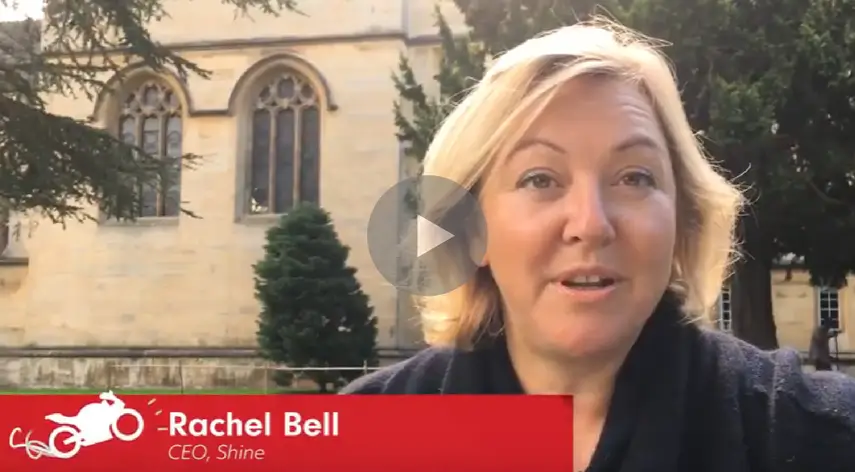
Meet my friend Rachel Bell – wife, mom and successful entrepreneur. She founded her company, Shine, in the UK in 1998 (about the same time I started Mitchell Communications Group) with a vision of building a public relations agency where everyone was encouraged to do just that.
Shine has won over 100 business and industry awards – and for good reason. They do terrific work, but Rachel also has an incredible gift for entrepreneurial thinking and developing others — qualities that have led her to co-found six award winning companies.
I’m proud to know her and have learned so much from her. I know you will benefit from her wisdom about the secret to achieving early success, and how to set goals without chasing them endlessly.
You can watch Rachel’s video here or read the transcription below.
Elise Mitchell: Are you a destination leader?
Rachel Bell: I would describe myself first and foremost as an entrepreneur because, perhaps what I’m most proud of is I’ve developed lots of talent within my businesses, which have gone on to allow me to start other businesses, which is great.
I definitely would describe myself as that. Primarily because I’ve always found right from the get-go of starting a business that I’ve needed clear goals from which to aim for in order to work out what exactly I was going to do to get there. So without a clear goal in mind, I don’t think I would even know where to begin to break that down into the stages that I needed to take to get there.
Your company has won many awards. How did you accomplish that?
RB: So right from the start, we set out with an ambition to be Best New Agency in two years and Best Agency in five. And we were actually Best Agency in the first year. And we got to be Best Agency in the UK in the first five. And without setting that plan down in the first place I know we would never have got there.
What’s the secret to achieving such early success?
RB: We actually started at the end of the journey in our mindset and worked our way back. So, in our minds we wrote the – well, we may have even actually drafted this looking back upon it – but we wrote out what our award entry, our winning award entry would say about us as a business if we were winning Agency of the Year. And we went from there to actually think about now what do we break that down into in terms of initiatives that we want to deploy to actually get us on that journey and to achieve it. So we set very clear KPIs on the way from which we measured ourselves. And so every quarter we would track our KPIs, our business KPIs, and so we would always know when if we were veering off course at all. Those KPIs crossed every aspect business from HR through to New Business to Finance.
How did it feel when you actually reached that goal?
RB: Do you know what actually? (laughs) It’s a – it was okay, but I don’t think um, I’d certainly say at that point in my journey I should have been absolutely elated, and given how hard we’d worked to get there. Uh, I was incredibly blasé about it, even a little bit deflated because at the point that we’d won that award, as a fantastic achievement it was, I actually didn’t know from that point quite what I wanted to do next. It sort of left – I’d been chasing it for such a long time that once we’d got it, I felt a little bit like ‘Okay, well, what now?’ And um, I had a great conversation with a friend of mine at the time who talked to me about the importance of setting your goals in a very fixed manner and not placing your ambitions onto the horizon. Because what he explained to me was that when you do that as you work towards your goal, you can find yourself pushing it off further on the horizon. As you step forward, it moves away. By very clear planted goals, and a succession of those, you can move through each goal and celebrate and enjoy that goal as you go. From that point on I sort of really learnt a lesson.
How do you set goals differently now?
RB: You have to have goals. I set goals now in a much more holistic fashion. So I used to think primarily about work, but now actually, and I feel this particularly as a woman with a family of three – I’ve got three young kids, getting older now – but I live in two destinations, I’ve got an awful lot going on in my life, several businesses. It became really important to consider the whole me in terms of what I wanted to achieve. So from that perspective, I set now goals for myself on a personal level as well as a professional level. And I try to keep those all in balance.
How do you find balance between work and family?
RB: As a mom, as a daughter, as a sister, as a wife – they’re all important to me. We did a training session once, quite a long time ago now, and it taught me a really valuable lesson. And that was to sit and write your own epitaph for how you would be viewed at your funeral by all of the people that are important to you in your life. And so I wrote my own epitaph as though it were for my mum, for my sister, for my husband. I thought about what it would be that I would want them to say about me. And it was a fantastic process because actually by going through that it made me realize where I was being successful at that time and where I wasn’t and where I wasn’t putting enough energy and purpose around it. And it changed my perspective and now every year I write myself goals across that spectrum of personal stakeholders, if you like.
Time is a precious commodity. How do you make the most of it?
RB: Absolutely. I was making some notes on things that we want to spend our time doing next year, trips I want to take with the kids, and thinking about how I want to portion my week up. Because every year the businesses change. The company grows. Maybe there’s another company in the mix. I have to think very, very carefully about how I’m going to portion my time because time is for certain one finite commodity that it doesn’t matter who you are, how important you might be, you never get more of it. So how you spend your time as you busier becomes ever more important.
So it’s okay to be goal-oriented — to be a destination leader?
RB: I think it’s more than okay. I think it’s imperative. I think if you don’t know where you’re going, you’ve got absolutely no hope of getting there. You have to be, um, on a journey and you need to be very clear in your own mind about what that journey looks like. How you want to get there, and what you want to be able to experience and enjoy along the way. It’s only by having a clear goal, a clear destination, will you ever have a hope of arriving at it.
So you don’t have to choose between having a work and a personal life?
RB: I think it’s really important that it isn’t one or another. I think for women particularly, if they want to be a success at work, they need to take a really holistic approach to their entire life. So that they’re building in enough flexibility for themselves to be able to do something in an evening, if that’s when they get a bit of spare time, that it suits them to actually pick up doing their email at some point. If they wake early and they want to clear a bit of email or write a bit of correspondence, then that’s okay. If you need to skip off work half an hour early to pick up the kids to do something. If you need to deal with a personal call, you do that. For me, that is how I’ve always looked at my life – is a hundred percent. I give a hundred percent to everything. But giving a hundred percent to everything means that sometimes one thing or another will butt into each other and that’s okay.



